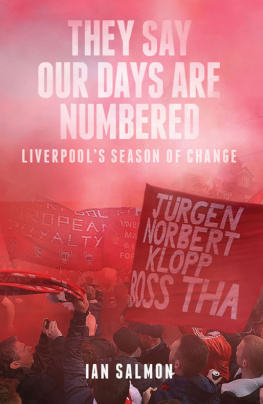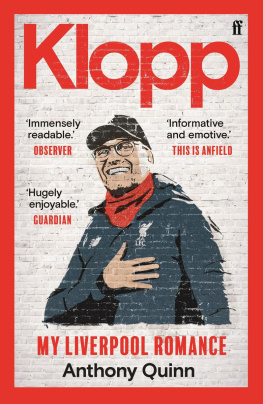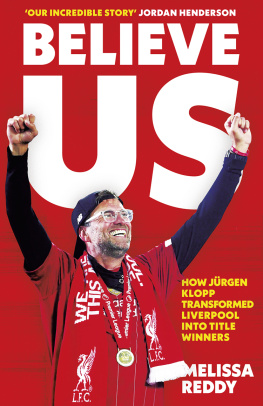Hachette Book Group supports the right to free expression and the value of copyright. The purpose of copyright is to encourage writers and artists to produce the creative works that enrich our culture.
The scanning, uploading, and distribution of this book without permission is a theft of the authors intellectual property. If you would like permission to use material from the book (other than for review purposes), please contact permissions@hbgusa.com .
Thank you for your support of the authors rights.
Published by Nation Books, an imprint of Perseus Books, LLC, a subsidiary of Hachette Book Group, Inc.
Nation Books is a co-publishing venture of the Nation Institute and the Perseus Books.
The publisher is not responsible for websites (or their content) that are not owned by the publisher.
The Black Forest isnt black. Its not even a forest. Not any more. Eighteen hundred years ago, the wild Germanic tribes of the Alemanni first tore through the massed gloom that had so scared the Romans, to make space for cattle and villages. Celtic missionaries from Scotland and Ireland, armed with axes and faith, kept pushing inward until nature was bested, iniquity contained. Today, the remnants of the darkness mostly serve as raw material for childrens nightmares and cuckoo clocks, as well as a magnificent tourism brand.
From all over the country and beyond, they flock to the low mountain range in Germanys south-westerly corner, to clear their lungs and hearts of all urban squalor. After the war, the Black Forest became a favourite of a film industry searching for an unsoiled backdrop, an idyllic setting for health clinics real and imagined, one of those places where fantasy and reality could blend into one another to enchanting effect.
Cynics beware, because it is, of course, all truein the picture-perfect town of Glatten. The neat white houses with their gingerbread rooftops and wooden balconies, unpretentiously pushed up against the hills, keeping watch over endless slopes of green. Others build on top of the hill, to show off their splendour. But Swabians build their houses into the hill, to hide how big they truly are, explains former Green party politician Rezzo Schlauch about the modest mindset of the local inhabitants, his kinsmen. They will keep the Mercedes in the garage and put the VW in the driveway.
The river Glatt (Old High German for bright or smooth) flows down from the north into the tiny town that borrowed its name, past the steel-clad J. Schmalz GmbH vacuum technology factory. The river is a discreet chaperon to the high street (car dealership, bank, bakery, butcher, florist, a doner kebab stand) and hesitant supplier to the natural swimming pool, flowing out again next to the sports ground past Bffingen, a village thats been absorbed by Glatten proper.
A difficult climatetheres a lot of rainmakes this a paradise won, not given. They grow grass, corn, piglets and people of fearsome resolve and frugality here; an extreme type of Germans, harder than hard-working, unwilling to give themselves an inch. Schaffe, schaffe, Husle baue: you work, work, then build a house; thats how the famous saying in this region goes.
To toil day and night is a big part of being Swabian, says Schlauch. That has its roots in history, as has the Swabians reputation for being innovative. In other regions, the first-born would inherit their parents farms. But in Swabia, the land was partitioned equitably among the children. The farmland got smaller and smaller until it was no longer viable, so the descendants were forced to take up other jobs. Many of them became inventors and Tftler, people looking to find new solutions to old problems.
Local custom demands that everything must be done studiously, seriously. Including fun. One of the fourteen active social clubs in Glatten is dedicated to Carnival. Another one brings together friends of the German Shepherd Dog.
Barns line a little street dotted with lumps of clay left behind by tractors, and then its here, right next to a field: Isolde Reichs Haarstble, a petite hair salon, discreet meeting place, outlet for charity socks hand-knitted by one of Reichs friends. The proceeds go towards buying shoes for the homeless.
Isolde was born in Glatten in 1962, the younger of two sisters. Her father Norbert, a talented goalkeeper, was a sport fanatic. Thwarted by a serious-minded fatherhe insisted Norbert should have a proper vocation, not try his hand at becoming a football pro, Reich sayshis career was over before it had really begun. His sporting ambitions, however, were undiminished. He played amateur football, handball and tennis, and tried to pass on his passion to his family. When his wife Elisabeth and eldest daughter Stefanie showed no inclination to take up any game, Norberts hopes centred on Isolde. Before her birth (In my album of baby photos, he wrote Isolde, you should have been a boy, actually, she smiles), and after. I was the first girl in all of Glatten to go to football training.
Norbert was her coach, his methods exacting and demanding. He took five-year-old Isolde to practise heading on the Riedwiesen football pitch next to the river, where an old heavy ball on a rope hung from a green iron bar. If her body positioning wasnt right or her arms were too high, Norbert sent her to run a lap around the pitch for punishment. He was tough but just. A man of principle, full of passion, Reich says.
In the summer of 1967, her mother left the family home for a month. Elisabeth was heavily pregnant, and the risk of complications made it necessary to check into a clinic in Stuttgart, 80 minutes away to the north-west. The local hospital at Freudenstadt, just 8.5km up the road, wasnt equipped to perform caesareans. It was hard for Stefanie and Isolde to be without their mother for such a long time. We were promised: Mum will bring something amazing for you when she comes back.
When Norbert and Elisabeth arrived at the house, however, they had a tiny baby in their arms, screaming its head off. After an hour or so, the sisters wondered whether it couldnt be taken back and exchanged for something different. A small, shrieking brotherwhat a lousy surprise! But Isolde soon realised that she had been given much more than a second, annoyingly loud sibling that day. All of my dads sporting focus shifted immediately on to the boy. I was relieved from practising headers with the pendulum, allowed to take up ballet and athletics instead. Jrgens birth was my good fortune really. He set me free.
Christian Heidel loves the story so much, hes beginning to wonder if its actually true. As a Mainzer, I could say: lets make this up. But it really happened, he insists, readying himself for a mental hyper-jump: from the corporate blandness of his Schalke 04 office to a city lustily singing and dancing in a confetti rain, and a tiny, hopeless second-division team banished to a distinctly unsexy, provincial exile forty minutes away by car.
The day before, on 25 February 2001, FSV Mainz 05 had played their bogey side SpvGG Greuther Frth and lost 3-1 at the Playmobil-Stadion. Klopp was a little bit injured and the worst man on the pitch, he had to come off twenty minutes before the end, Heidel says. The defeat plunged Mainz deep into the relegation zone. We were













![Dietmar Hamann [Dietmar Hamann] - The Didi Man](/uploads/posts/book/46092/thumbs/dietmar-hamann-dietmar-hamann-the-didi-man.jpg)